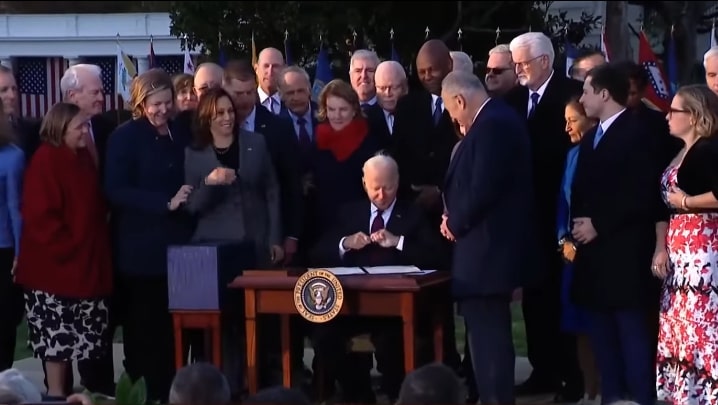US Infra Act: Cryptoverse Says the Fight Isn’t Over, But Things Could Get ‘Messy’

Crypto advocates have vowed to keep fighting the controversial Infrastructure Investment and Jobs Act despite the fact that the United States President Joe Biden signed the act into law on Monday, leaving much-maligned “digital asset broker” status clauses intact.
The American crypto community had fought in both the Senate and Congress to amend the definition of “broker” in the bill, but these efforts now appear to have been in vain – meaning that miners and node operators could now be forced to make complicated crypto tax calculations. Unless, that is, the Treasury decides to fine-tune the legislation.
In the Senate, the ball is already rolling, with the pro-crypto senators Cynthia Lummis and Ron Wyden co-sponsoring a draft amendment to the act.
If successful, the amendment would unpick some of the most problematic clauses of the act, and would explicitly exclude crypto miners, staking participants, blockchain software developers, and wallet developers from broker status. This would allow them to avoid filing exhaustive data to the Internal Revenue Service (IRS).
On Twitter, Lummis promised that “If at first you don’t succeed,” she and other pro-crypto lawmakers would try, try and try again to make changes to the law.
In a press release, Wyden explained:
“It’s critically important to protect innovation in the digital asset space. Our bill makes clear that the new reporting requirements do not apply to individuals developing blockchain technology and wallets. This will protect American innovation while at the same time ensuring those who buy and sell cryptocurrency pay the taxes they already owe.”
A triumphant Biden had earlier called the bill a “blue-collar blueprint to rebuild America” at a signing ceremony at the White House in Washington D.C., Reuters reported.
In comments shared with Cryptonews.com, Bill Tulloh, an Economist at Agoric, a smart contract platform, called the act a “wake-up call to the crypto industry,” claiming that the sector now “needs to mobilize to undo the damages caused by this bill and prevent further damage in the future.”
Tulloh called the act a “hastily conceived and ill-considered” piece of legislation, adding that “short-term tax revenues shouldn’t stifle the pace of innovation and discovery required for a young industry to mature.”
On a more optimistic note, the economist added that Randall Quarles’ announcement that he will step down as Federal Board Governor “gives President Biden the opportunity to nominate a candidate who can take a longer view on the promise of crypto commerce.”
Amber Ghaddar, the co-founder of AllianceBlock, a firm that aims to close the gap between decentralized finance (DeFi) and traditional finance, reflected that the act’s broker clauses were “partly” the crypto community’s “fault for not ironically ‘centralizing’ our efforts to not only lobby but also explain to key stakeholders how our protocols work.”
Ghaddar advised:
“Working in good faith with governments and regulators worldwide is a necessity. We are not here to evade our taxes or launder money as some seem to believe. I am confident that there is a strong probability we will see amendments or even stand-alone laws that will be passed before 2024 [when the provisions are slated to come into force].”
But she added that “the passage” of the new act “could be very messy for small investors,” explaining with the following example:
“If a DeFi or self custody user transfers a certain amount from their wallet to the exchange, the exchange will consider the dollar amount sent as a sale. But it doesn’t know how much the client initially paid for the tokens. The user can then end up with an overstated 1099-B [tax form], forcing them to actually hire an accountant or manually reconcile.”
The act has been designed to create jobs across the USA by pumping billions of USD into state- and local government-backed projects involving repairing roads and widening broadband internet access.
____
Learn more:
– ‘Pernicious’ Reporting Clause Irks US Crypto Industry as House Votes on Infra Bill
– US Infra Bill Provision May Force Crypto Users To Report USD 10K+ Transactions
– Task Force to Tell Washington: Ramp Up Crypto Exchange Regulation
– Ripple Chief: US Risks ‘Chaos’ by Letting China Win Blockchain Race
– DeFi Industry Must Tackle Lack Of Transparency, Pseudonymity: SEC Commissioner
– Regulators are Coming for the DeFi Goose and Its Golden Eggs




